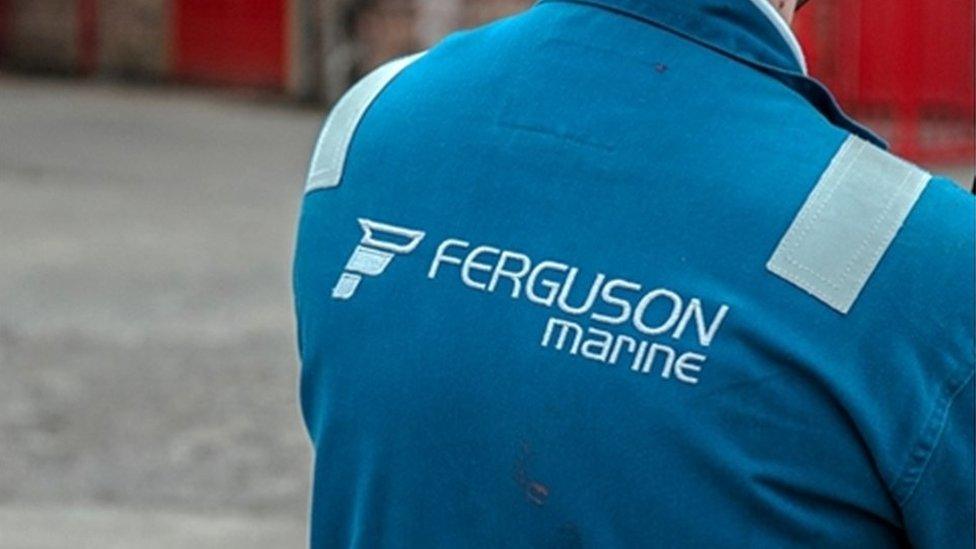Who pays the ferryman? Stage set for legal battle in 2019
- Published
Governments and business are having an unusually rocky set of relationships at present, from Brexit uncertainty to road, NHS and ferry contracts gone badly awry
New light has been shed on the growing dispute over the building of two Hebridean ferries at Ferguson Marine in Inverclyde
The client, representing the taxpayer, is hitting back firmly at claims that the new ships have gone £44m over budget because of post-contract interference
But as this dispute heads for the Court of Session, the loser could be the Scottish government, having ploughed in £60m in loans, and with nowhere else in Scotland to build new ferries
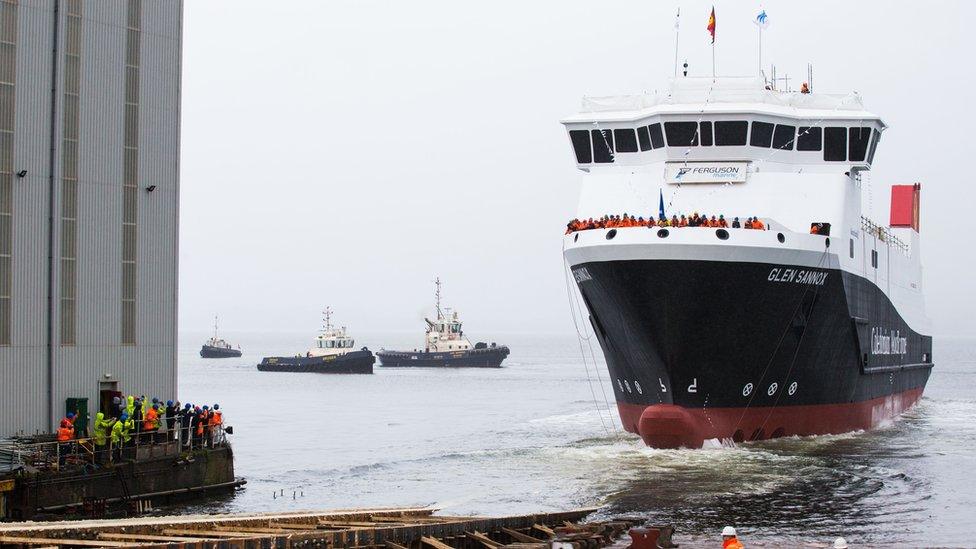
MV Glen Sannox was expected to be ready last summer
New light has been shed in the mid-winter gloom on one of the disputes between government and business that look likely to be a feature of 2019.
The big dispute, of course, is over Brexit. It may have eased up for festive holidays, but be sure that the corporate warning klaxons are going to sound loudly as MPs return to Westminster.
The year ends with a dispute over the insolvent Kaiam electronics plant in Livingston. The departed boss has told MSPs that he had warned Scottish Enterprise well in advance.
He says the Scottish government agency did not do enough to avoid redundancies on Christmas Eve. That's while acknowledging that a cashflow bailout might not have been the wisest use of public funds.
Just ahead of then, the Lanarkshire company which lost contracts to incinerate NHS body parts and other waste has ceased trading and sacked workers, in very unusual circumstances.
Brexit logjams
And there's the Aberdeen bypass. I've heard from one major contractor that Transport Scotland could struggle to get firms to tender for future contracts, after the way this one has gone.
In Whitehall, the Carillion collapse was an uncomfortable part of 2018. Another such large contractor Interserve is now the focus of concern, while Keir Group worryingly failed to persuade its investors to back it in a cash call.
The year has ended with the absurdity of a freight company being contracted by the UK government to break through any cross-Channel Brexit logjams, despite having no ships.
The default media narratives are either of profiteering business fat cats or of incompetent government ministers/officials. It's possible to have both, or neither. So I won't take sides in relating the facts of the looming legal battle over two Cal Mac ferries being built in Port Glasgow.
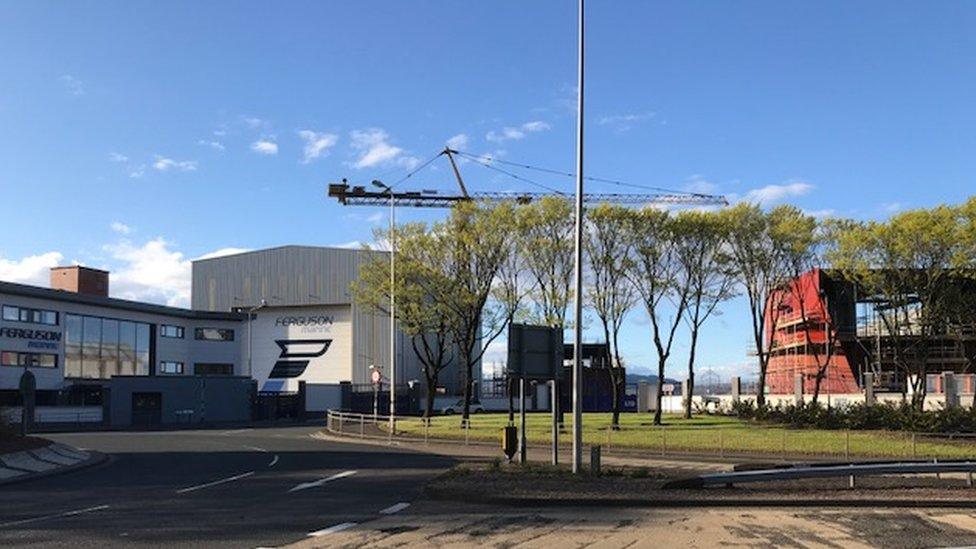
The Scottish government has loaned £30m to the shipyard
The Ferguson shipyard, where they are under construction, is a fine sight, even through the December dark in Port Glasgow. Decrepit sheds have been fully replaced, and plush new offices have replaced industrial brickwork.
The signage points to a proud present and a confident future as much as a long past. Hull number 802 looms over the front gate.
This is destined to be a ferry crossing the Minch between Skye, Harris and North Uist, updating an ageing Cal Mac fleet and expanding its stretched capacity.
The other ship, Hull 801, the Glen Sannox, is alongside the quay, still far from shipshape for its Arran to Ayrshire crossing, and its delivery delayed.
This contract is not a happy ship. Despite the appearance of a confident future with the red oxide paint on the hull, there's a lot of red ink in the offices.
The decisions are now being made in East Kilbride, where the registered office is with Jim McColl's Clyde Blowers. He took the firm out of administration in 2014, in the closing days of the independence referendum, and was hailed as a hero by the SNP government.
Four and a half years later, he has reported a £60m loss.
Some companies can sustain a loss of £60m, particularly as they go through transition. But the figure is particularly alarming for a company which had revenue of only 30% of that loss, or £18m.

Jim McColl said the buyer should meet the cost of any changes to the ferry contract
The accounts for 2016, published just before Christmas (the 2017 accounts were already overdue) explain "the Kaiser rule" of 1:3:8 - working on a ship takes eight times longer when it's in the water than it does where the keel is first laid in the engineering shed. It takes three times longer to do the same amount of work on the slipway.
Ferguson Marine set out its problems in a lot of detail with the 2016 accounts, almost as if it wants to get its message across very clearly.
One problem is that this is being built with what it calls a "prototype" dual-fuel (diesel and liquified natural gas) engine. The company is proud of being an innovator with hybrid electric-diesel ferries and plans to expand into hydrogen fuel. But innovation comes with risks, and marine certification can be a slow process on a ship where new ideas are being tried out.
Ferguson says that its client, Caledonian Maritime Assets Limited (CMAL) is responsible for variation, interference and disruption of the project after the contract had been awarded.
From July 2017 to July 2018, Jim McColl was trying to get the Scottish government-owned company to agree that it should bear more of the risk of this. It responded with evidence that the contract was clear about the risks being taken on.
In a series of increasingly tetchy emails, partly exposed through a Freedom of Information request, those negotiations broke down and the dispute is in the hands of Ferguson's lawyers, soon to lodge their case in the Court of Session.
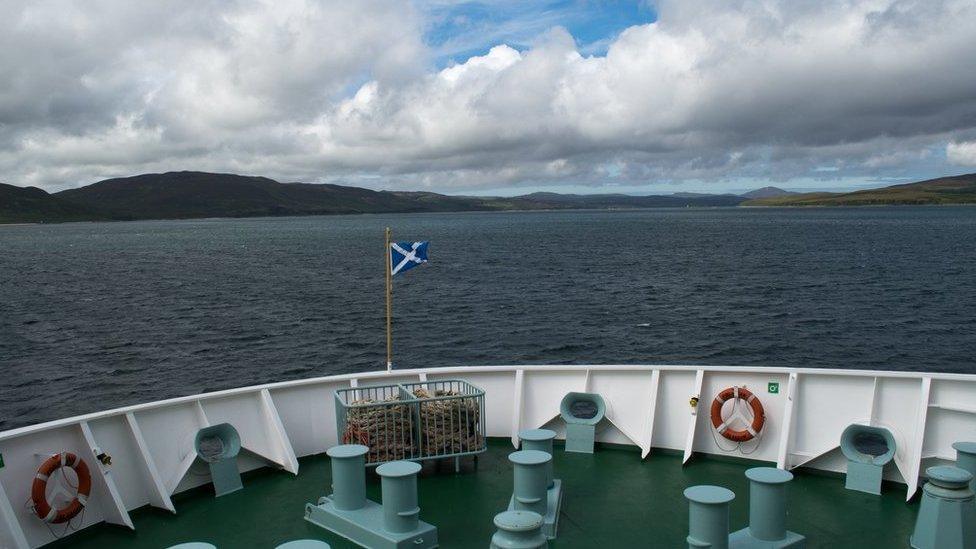
The new ferries have been commissioned to serve Hebridean routes
Yet while Ferguson wants the taxpayer to bear more of the burden of the cost over-run, it's already depending on the taxpayer for working capital.
The accounts make clear that its finances are in some peril. It can only be considered "a going concern" if a number of factors align favourably.
£8.5m additional capital from Jim McColl's Clyde Blowers fund by April
The extension of a Scottish government £15m loan beyond 2020, by which time it will carry a £5m interest charge
Drawing down a further £30m Scottish government loan during January
Getting 14% better productivity on Hull 802 than it got out of Hull 801
Nothing else major going wrong
New contracts being won. For that, Ferguson talks of its part in a multi-yard bid to build the next class of Royal Navy frigates, plus fishing boats, fabrication for offshore energy, decommissioning of offshore energy and more contracts for the Cal Mac fleet.
Those Cal Mac orders ought to be flowing already, given the problems of old boats and too little capacity. Being in a legal dispute over these two ships probably isn't going to make relations with CMAL any easier for talks on new contracts.
And there's a perverse catch to that taxpayer funding. If Ferguson is successful in legal action against CMAL (which would then require funding from the Scottish government), it seems the contracts for these big loans require that they should be repaid. Some extra millions of ferry funding in: up to £60m in loans out.
A further red light on this. The auditors, at Ernst & Young, are not confident they've got the whole story.
Their notes with the 2016 account raise a question mark over the decision of directors to write down the value of the assets to zero.
The auditors cannot see the basis for this assumption, when: "We have not obtained all the information and explanations that we considered necessary for the purpose of our audit, and we were unable to determine whether adequate accounting records had been kept."
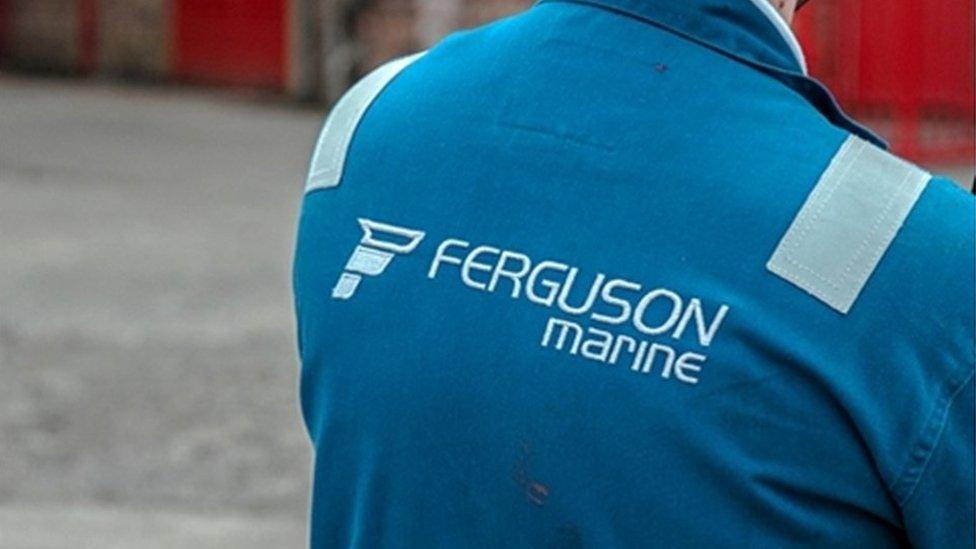
That Freedom of Information release provides insight into the looming legal battle, when Jim McColl's lawyers lodge a claim that the £97m contract price should be raised, with CMAL (the taxpayer) paying a share of the £44m loss on the contract projected by FMEL (£40m of that booked in the 2016 accounts).
The Scottish government response carries the usual redactions at points when things look like they were about to get interesting.
Jim McColl was keen to press his case back in July 2017: "We are attempting to work through the cost impact areas with CMAL. However, we appear to be coming at this from different mind-sets".
Last March, in a letter to then transport minister Humza Yousaf, Mr McColl wrote "We have been trying to engage with CMAL over the past year to discuss the significant cost increases resulting from the unforeseen complexities which have arisen."
Two weeks later, the Clyde Blowers boss was seeking to assert there were "external circumstances which they [the contracting authorities] could not foresee when they awarded the contract. We believe there have been..."
'Unforeseen complexities'
On 1 May this year, Finance Secretary Derek Mackay was reassuring CMAL that, yes, ministers were frustrated at the delays, but they believed CMAL was acting diligently and professionally. It's almost as if someone had suggested otherwise, amid the bits we are not allowed to read.
Mr McColl later set out in more detail, "unforeseen complexities and circumstances which have had a significant impact on the costs of completing the contracts... which would justify a price increase".
And then we get to the most interesting bit - a robust response, from Caledonian Maritime Assets Ltd to Ferguson Marine Engineering: "The contract into which you willingly entered was for a 'design and build'.
"During the tender process, FMEL put together a bid that was extremely detailed and held out to be competent to deliver, which we accepted leading to the contract signing," wrote CMAL.
"These two vessels are neither innovative or highly complex as you continually report. There are many dual fuel and LNG vessels currently in operation and many more currently under construction as succinctly pointed out by [redacted]..."
That's where the public information ends and the legal battle begins.
Worthless assets?
It could get messy. To recap, Ferguson needs the taxpayer money to meet part of the contract overrun. It also needs big taxpayer loans to remain solvent beyond the end of January. It then needs further Cal Mac contracts.
But if it's in such a messy dispute with Ferguson, and possibly for some time, CMAL is not well placed to sign new contracts. Nor is the Scottish government.
But the Scottish government is under pressure to build more Cal Mac vessels. Ferguson Marine looks like the only Scottish shipbuilder capable of constructing them.
The Scottish government would lose very significant loan funds if FMEL goes bust. And the FMEL directors' assertion (not backed up by auditors) that the assets are worthless will help focus the government's mind on that potential loss.
Ministers would also lose politically if an acknowledged strategic industrial asset is allowed to fail.
And as Jim McColl is the main figure on the other side of this dispute, he's not someone who can be easily portrayed as a fly-by-night profiteer. He's got some significant business heft.
So what to do? Well, for me, it's an easy win among new year predictions. I'd say that this is one to watch.
- Published20 December 2018

- Published7 December 2018

- Published29 August 2018

- Published28 June 2018
